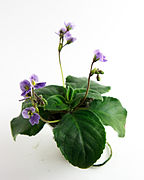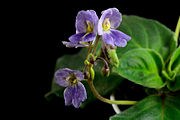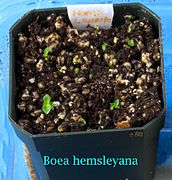Boea: Difference between revisions
italics |
No edit summary |
||
| (31 intermediate revisions by 23 users not shown) | |||
| Line 1: | Line 1: | ||
{{Short description|Genus of flowering plants}} |
|||
| ⚫ | |||
{{for|the town of ancient Greece|Boea (Laconia)}} |
|||
|image = Boea hygroscopica.jpg |
|||
| ⚫ | |||
|image_width = 250px |
|||
| |
| image = Boea hygroscopica.jpg |
||
| |
| image_caption = ''[[Boea hygroscopica]]'' |
||
| ⚫ | |||
| subregnum = [[Tracheobionta]] |
|||
| authority = [[Philibert Commerson|Comm.]] ex [[Jean-Baptiste Lamarck|Lam.]] (1785) |
|||
| divisio = [[Magnoliophyta]] |
|||
| |
| type_species = ''[[Boea magellanica]]'' |
||
| subclassis = [[Asteridae]] |
|||
| ordo = [[Lamiales]] |
|||
| familia = [[Gesneriaceae]] |
|||
| subfamilia = [[Cyrtandroideae]] |
|||
| tribus = [[Didymocarpeae]] |
|||
| ⚫ | |||
| genus_authority = [[Comm.]] ex [[Lam.]] |
|||
| type_species = ''Boea magellanica'' |
|||
| type_species_authority = Lam. |
| type_species_authority = Lam. |
||
| subdivision_ranks = Species |
| subdivision_ranks = Species |
||
| subdivision = |
| subdivision = 12; see text |
||
| subdivision_ref = <ref name = powo>[https://powo.science.kew.org/taxon/urn:lsid:ipni.org:names:16915-1 ''Boea'' Comm. ex Lam.] ''[[Plants of the World Online]]''. Retrieved 5 August 2024.</ref> |
|||
| synonyms = |
| synonyms = |
||
| ⚫ | |||
* ''Dorcoceras'' Bunge |
|||
| synonyms_ref = <ref name = powo/> |
|||
| ⚫ | |||
}} |
}} |
||
'''''Boea''''' is a [[genus]] of plants in the [[Gesneriaceae]] |
'''''Boea''''' is a [[genus]] of plants in the family [[Gesneriaceae]], with species originating from [[Australia]], [[China]], [[India]], [[Malaysia]], [[Myanmar]], [[Philippines]], [[Polynesia]], [[Solomon Islands]], [[Thailand]], [[Papua New Guinea]], [[Indonesia]], [[Nepal]], [[Bhutan]], [[Cambodia]], [[Vietnam]] and [[Laos]].<ref name=SI_checklist>Skog, L.E. & J.K. Boggan. 2007. [http://botany.si.edu/Gesneriaceae/Checklist World Checklist of Gesneriaceae]. Washington, DC: Dept. of Botany, Smithsonian Institution.</ref> |
||
For example, '' |
For example, ''B. hygroscopica'', also known as the Queensland rock violet in Australia, occurs in Cape York Peninsula and Northeast Queensland as far south as Rockhampton, from {{convert|60|–|900|m}} elevation. It grows along creek beds, on moist banks, moss-covered rocks in rainforest, open forest, vine forest and gallery forest.<ref name="RFK">{{cite web |author1=F.A.Zich |author2=B.P.M.Hyland |author3=T.Whiffen |author4=R.A.Kerrigan |author2-link=Bernard Hyland |year=2020 |url=https://apps.lucidcentral.org/rainforest/text/entities/Boea_hygroscopica.htm |title=''Boea hygroscopica'' |website=[[Australian Tropical Rainforest Plants]] Edition 8 (RFK8) |publisher=Centre for Australian National Biodiversity Research (CANBR), [[Australian Government]] |access-date=21 June 2021}}</ref> |
||
Some Boea species are known as types of [[resurrection plant]] due to their ability to survive |
Some ''Boea'' species are known as types of [[resurrection plant]] due to their ability to survive desiccation (e.g. ''B. hygrometrica'' and ''[[Boea hygroscopica|B. hygroscopica]]'').<ref>Jiang,G et al. 2007. Planta, May 2007, Volume 225, Issue 6, pp 1405-1420</ref><ref>Navari-Izzo,F et al. 2006. Physiologica Plantarum, Unusual composition of thylakoid membranes of the resurrection plant Boea hygroscopica: Changes in lipids upon dehydration and rehydration, Volume 94, Issue 1, pages 135–142, May 1995</ref> |
||
<gallery widths="180px" heights="180px"> |
|||
| ⚫ | |||
| ⚫ | |||
The Smithsonian lists the following Boea species <ref>Skog, L.E. & J.K. Boggan. 2007. World Checklist of Gesneriaceae. Washington, DC: Dept. of Botany, Smithsonian Institution. http://botany.si.edu/Gesneriaceae/Checklist </ref>. |
|||
File:Boea hemsleyana flowers.jpg|''Boea hemsleyana'' flowers |
|||
{| class="wikitable" |
|||
File:Boea hemsleyana seedlings.jpg|''Boea hemsleyana'' seedlings |
|||
|- |
|||
</gallery> |
|||
|''[[Boea clarkeana]]''||''[[Boea dennisii]]''||''[[Boea esquirolii]]'' |
|||
|- |
|||
| ⚫ | |||
|- |
|||
|''[[Boea hygrometrica]]''||''[[Boea hygroscopica]]''||''[[Boea kinnearii]]'' |
|||
|- |
|||
|''[[Boea lawesii]]''||''[[Boea magellanica]]''||''[[Boea mollis]]'' |
|||
|- |
|||
|''[[Boea philippensis]]''||''[[Boea rosselensis]]''||''[[Boea urvillei ]]'' |
|||
|- |
|||
|''[[Boea wallichii ]]''||'''||''' |
|||
|- |
|||
| ⚫ | |||
==Cultivation== |
|||
The Smithsonian also lists<ref>Skog, L.E. & J.K. Boggan. 2007. World Checklist of Gesneriaceae. Washington, DC: Dept. of Botany, Smithsonian Institution. http://botany.si.edu/Gesneriaceae/Checklist </ref>: |
|||
These cultivation notes are based on ''[[Boea hygroscopica|B. hygroscopica]]'', a species from [[Northern Queensland]], [[Australia]].<ref>Jacson, S. [http://www.members.westnet.com.au/wackos/PDFs/Growing%20your%20Boea%20hygroscopica.pdf Tropiclimber Cultivation Information].</ref> |
|||
| ⚫ | |||
| ⚫ | |||
''B. hygroscopica'' grows to about {{convert|15|cm|in|0}}, and forms a dense, velvety clump that flowers over many weeks in the warm months. |
|||
| ⚫ | |||
{{reflist}} |
|||
A well-drained soil is suggested for this plant, achieved by using a potting mix with 20% sand content, and 5mm (~0.2 inches) of scoria or other drainage material in the bottom of the pot. A fertilizer with an [[NPK]] ratio of about 13.8:3.2:9.9, plus trace elements, is recommended. |
|||
{{DEFAULTSORT:Boea}} |
|||
| ⚫ | |||
This plant prefers bright, filtered light, possibly with some early-morning direct sun. It can be planted in the garden in a well-drained, consistently moist location. |
|||
The only major pests of this plant are chewing insects such as [[grasshopper]]s and [[caterpillar]]s. |
|||
| ⚫ | |||
12 species are accepted.<ref name = powo/> |
|||
{{columns-list|colwidth=22em| |
|||
*''[[Boea dennisii]]'' {{small|B.L.Burtt}} |
|||
*''[[Boea hemsleyana]]'' {{small|B.L.Burtt}} |
|||
*''[[Boea hians]]'' {{small|Burkill}} |
|||
*''[[Boea hygroscopica]]'' {{small|F.Muell.}} |
|||
*''[[Boea kinnearii]]'' {{small|(F.Muell.) B.L.Burtt}} |
|||
*''[[Boea lawesii]]'' {{small|(F.Muell.) H.O.Forbes}} |
|||
*''[[Boea magellanica]]'' {{small|Lam.}} |
|||
*''[[Boea mollis]]'' {{small|Schltr.}} |
|||
*''[[Boea morobensis]]'' {{small|C.Puglisi}} |
|||
*''[[Boea resupinata]]'' {{small|Zich & B.Gray}} |
|||
*''[[Boea rosselensis]]'' {{small|B.L.Burtt}} |
|||
*''[[Boea urvillei]]'' {{small|C.B.Clarke}} |
|||
| ⚫ | |||
The Smithsonian also lists:<ref name=SI_checklist/> |
|||
| ⚫ | |||
| ⚫ | |||
| ⚫ | |||
{{Reflist}} |
|||
{{Taxonbar|from=Q1946132}} |
|||
[[Category:Didymocarpoideae]] |
|||
| ⚫ | |||
[[Category:House plants]] |
[[Category:House plants]] |
||
[[Category: |
[[Category:Australasian realm flora]] |
||
[[Category:Taxa described in 1785]] |
|||
Latest revision as of 02:57, 6 August 2024
| Boea | |
|---|---|

| |
| Boea hygroscopica | |
| Scientific classification | |
| Kingdom: | Plantae |
| Clade: | Tracheophytes |
| Clade: | Angiosperms |
| Clade: | Eudicots |
| Clade: | Asterids |
| Order: | Lamiales |
| Family: | Gesneriaceae |
| Subfamily: | Didymocarpoideae |
| Genus: | Boea Comm. ex Lam. (1785) |
| Type species | |
| Boea magellanica Lam.
| |
| Species[1] | |
|
12; see text | |
| Synonyms[1] | |
| |
Boea is a genus of plants in the family Gesneriaceae, with species originating from Australia, China, India, Malaysia, Myanmar, Philippines, Polynesia, Solomon Islands, Thailand, Papua New Guinea, Indonesia, Nepal, Bhutan, Cambodia, Vietnam and Laos.[2]
For example, B. hygroscopica, also known as the Queensland rock violet in Australia, occurs in Cape York Peninsula and Northeast Queensland as far south as Rockhampton, from 60–900 metres (200–2,950 ft) elevation. It grows along creek beds, on moist banks, moss-covered rocks in rainforest, open forest, vine forest and gallery forest.[3]
Some Boea species are known as types of resurrection plant due to their ability to survive desiccation (e.g. B. hygrometrica and B. hygroscopica).[4][5]
-
Boea hemsleyana plant
-
Boea hemsleyana flowers
-
Boea hemsleyana seedlings
Cultivation
[edit]These cultivation notes are based on B. hygroscopica, a species from Northern Queensland, Australia.[6]
B. hygroscopica grows to about 15 centimetres (6 in), and forms a dense, velvety clump that flowers over many weeks in the warm months.
A well-drained soil is suggested for this plant, achieved by using a potting mix with 20% sand content, and 5mm (~0.2 inches) of scoria or other drainage material in the bottom of the pot. A fertilizer with an NPK ratio of about 13.8:3.2:9.9, plus trace elements, is recommended.
This plant prefers bright, filtered light, possibly with some early-morning direct sun. It can be planted in the garden in a well-drained, consistently moist location.
The only major pests of this plant are chewing insects such as grasshoppers and caterpillars.
Species
[edit]12 species are accepted.[1]
- Boea dennisii B.L.Burtt
- Boea hemsleyana B.L.Burtt
- Boea hians Burkill
- Boea hygroscopica F.Muell.
- Boea kinnearii (F.Muell.) B.L.Burtt
- Boea lawesii (F.Muell.) H.O.Forbes
- Boea magellanica Lam.
- Boea mollis Schltr.
- Boea morobensis C.Puglisi
- Boea resupinata Zich & B.Gray
- Boea rosselensis B.L.Burtt
- Boea urvillei C.B.Clarke
The Smithsonian also lists:[2]
- Kaisupeea herbacea with the basionym: Boea herbacea
- Leptoboea multiflora with the previous synonym Boea multiflora
References
[edit]- ^ a b c Boea Comm. ex Lam. Plants of the World Online. Retrieved 5 August 2024.
- ^ a b Skog, L.E. & J.K. Boggan. 2007. World Checklist of Gesneriaceae. Washington, DC: Dept. of Botany, Smithsonian Institution.
- ^ F.A.Zich; B.P.M.Hyland; T.Whiffen; R.A.Kerrigan (2020). "Boea hygroscopica". Australian Tropical Rainforest Plants Edition 8 (RFK8). Centre for Australian National Biodiversity Research (CANBR), Australian Government. Retrieved 21 June 2021.
- ^ Jiang,G et al. 2007. Planta, May 2007, Volume 225, Issue 6, pp 1405-1420
- ^ Navari-Izzo,F et al. 2006. Physiologica Plantarum, Unusual composition of thylakoid membranes of the resurrection plant Boea hygroscopica: Changes in lipids upon dehydration and rehydration, Volume 94, Issue 1, pages 135–142, May 1995
- ^ Jacson, S. Tropiclimber Cultivation Information.



